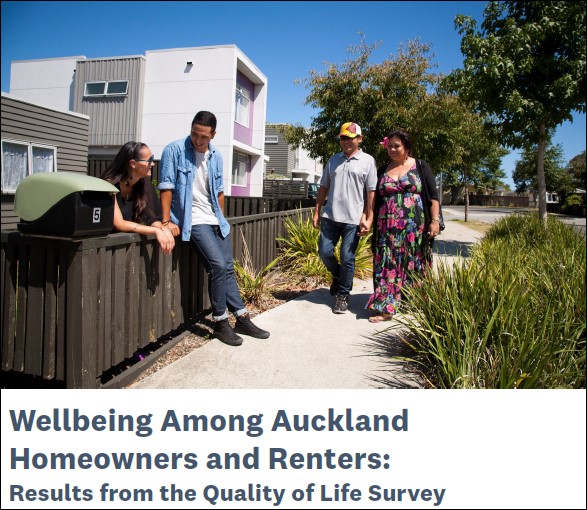Wellbeing among Auckland homeowners and renters: results from the Quality of Life survey
Author:
Ashleigh PrakashSource:
Auckland Council Research and Evaluation Unit, RIMUPublication date:
2023Topics:
HousingFrom the Executive summary:
Housing tenure and subjective wellbeing
Auckland Council is committed to ensuring that all Aucklanders have access to healthy, secure, and affordable homes, whether they are homeowners or renters. Not everyone can afford to, or chooses to, purchase their own home. Worsening housing affordability has led to the emergence of renting as a long-term tenure type for many people, especially in Auckland, where over 40 per cent of households were renting their home at the 2018 Census. However, the burden of housing costs on renters tends to be heavy and the quality of rental homes is generally lower than that of owner-occupied homes. Flow-on effects on renters can be observed in often poorer health and educational outcomes, relative to those who own their own home.
Existing research notes the discrepancy in wellbeing for homeowners and renters. Homeowners tend to experience the following benefits more so than renters:
- Tenure security: more control and independence over one’s circumstances, less uncertaintyabout the stability of one’s tenure
- Financial: wealth accumulation and the ability to pass on generational wealth to family, aswell as being able to leverage equity and enable flexibility in the face of economic hardship
- Health benefits: better able to access housing that meets healthy home standards, resultingin better physical and mental health, and less stress
- Social benefits: greater participation in the surrounding community and social inclusion.
In view of the evidence, Auckland has a strategic direction to shift the region towards a housing system that provides secure, high-quality, and affordable homes for all, regardless of tenure, which is outlined in the Auckland Plan 2050. This will help ensure that renting is not a second-rate option to homeownership and better serves Aucklanders.
This report
Rangahau te Korou o te Ora/The Quality of Life project is a long-running biennial local government survey in Aotearoa New Zealand that aims to understand the wellbeing of New Zealand residents and communities in urban areas. The project provides an opportunity to use a rich data source to understand wellbeing for homeowners and renters, which will add to the evidence base and inform understandings of whether current council actions are effective at improving the renting experience in Auckland.
This report analyses data from the 2022 Quality of Life survey to understand the relationship between housing tenure and wellbeing for Auckland respondents. The 2022 survey collected data from a total of 7518 New Zealanders aged 18 and over, of whom 2612 were Auckland residents. Survey fieldwork took place from the end of March to mid-June 2022. Respondents were sampled using the New Zealand Electoral Roll, and potential participants were mailed a letter inviting them to complete the survey online or via hard copy. The sample was also boosted by recontacting previous 2018 and 2020 participants (who had previously consented to recontact for this purpose) to invite them to complete the survey.
Of the 2612 Auckland respondents, almost three-quarters (70.6%) were classified as an ‘owner-occupier’ (i.e. they reported that they either owned their own home with or without a mortgage, their home was held in a family trust, or they lived in a home owned by parents, a partner, or other relatives). Smaller proportions of the sample rented their home from a private landlord (20.4%) or from a social housing provider (6.9%). Housing tenure was unknown for the remaining 2.1 per cent of the Auckland sample.
In addition to using results from the 2022 survey, data from previous Quality of Life surveys (2012 to 2020) were analysed, where possible, to understand how wellbeing has changed over time based on housing tenure. Analysis was undertaken to understand changes over time for owner-occupiers and renters in their perceptions of overall quality of life, income adequacy, housing affordability, housing suitability, housing habitability, subjective wellbeing, and connectedness to community. ...
Auckland Council technical report, TR2023/6
April 2023
See also
